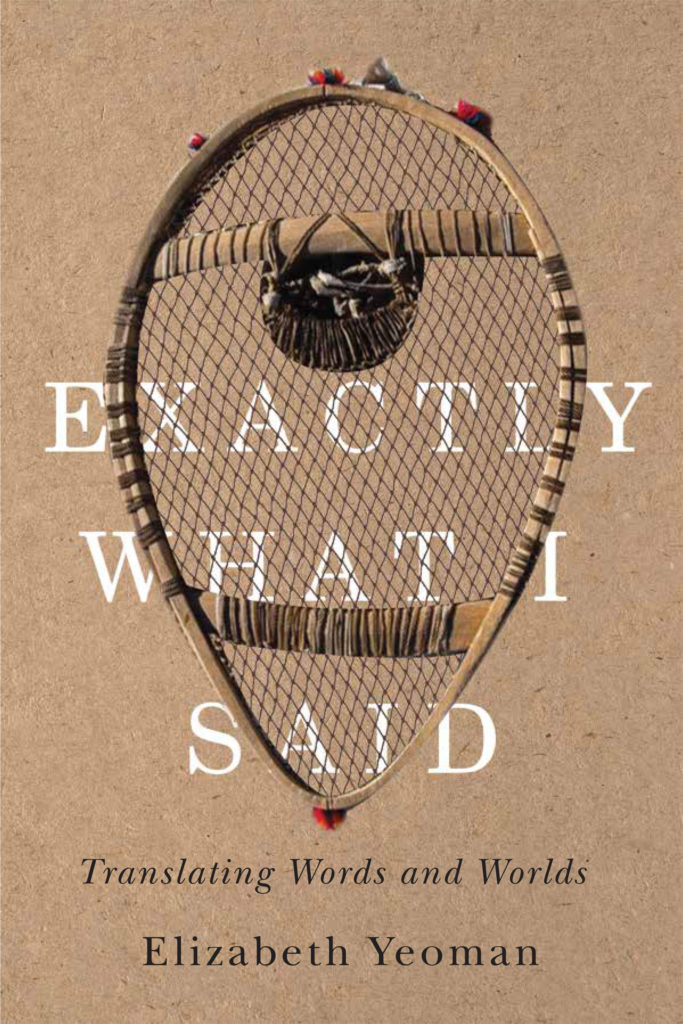Reviewed by Regan Treewater, Local Journalism Initiative Reporter
(ANNews) – Professor Elizabeth Yeoman, who recently retired from her post at the Memorial University of Newfoundland, has dedicated her life to discovering new approaches to building bridges of historical and cultural understanding. Her newest project is an extension of an earlier undertaking proudly supported by NL Intangible Heritage, ArtsNL, the Smallwood Foundation, The Memorial University of Newfoundland’s Canada Research Chair in Aboriginal Studies, and the prestigious Social Sciences and Humanities Research Council of Canada.
 Yeoman describes the resulting book, Exactly What I Said: Translating Words and Worlds (2022), by saying: “It is a firsthand account of Innu history by an Innu woman who was an inspiring leader through perhaps the most tumultuous and challenging times her people had ever known.” The woman to whom Yeoman refers is Tshaukuesh who “had been leading this annual week-long walk in Innusi – Innu territory – since the 1990s as a way of demonstrating that this is Innu land, and the Innu are still here, still using it.”
Yeoman describes the resulting book, Exactly What I Said: Translating Words and Worlds (2022), by saying: “It is a firsthand account of Innu history by an Innu woman who was an inspiring leader through perhaps the most tumultuous and challenging times her people had ever known.” The woman to whom Yeoman refers is Tshaukuesh who “had been leading this annual week-long walk in Innusi – Innu territory – since the 1990s as a way of demonstrating that this is Innu land, and the Innu are still here, still using it.”
The text chronicles the discoveries Yeoman made as she engaged with the land being reintroduced to her, “I had not walked it, but I knew it when I saw it. The map-making and storytelling had etched into my memory,” and the meaningful relationship forged between herself and a woman she now regards with unwavering respect and admiration. “I knew her work and her reputation. Everyone in Newfoundland and Labrador does, and so do many more all around the world.”
Published by the University of Manitoba Press, Exactly What I Said: Translating Words and Worlds, is a highly personal and intimate approach to broaching discussions around cultural understanding and traditional practices. The author makes every effort to maintain the authenticity of Tshaukuesh’s teachings, and factual representation of customs and traditions. Even the snow-shoe image that appears as cover art for the book was selected with exceeding care, and in collaboration with Tshaukuesh.
Yeoman, a researcher of pedagogy, explores topics like linguistic code-switching and tries to reimagine the boundaries of language and communication: “There are also some very practical challenges for poetic encounters and storytelling across languages – and particularly for work in Indigenous languages.” She goes on to state: “Students studying other literatures are almost always required to learn the languages and to study them in the original. Why would literary work in Indigenous languages not be taught in the same way?”
Yeoman raises an excellent question regarding the Canon of World Literature and Indigenous, First Nations, Inuit, and Metis representation absent of the Anglophone or Francophone lens.
With dignity and love evident in her every word, Yeoman explores some of the painful realities associated with tangible memory, physical place, and cultural presence. The author’s depth of connection with the subject and the topics outlined in her book result in a nuanced portrayal of the Innu world and way of life. Although Yeoman approaches more scholarly discussions in her text, the format of her book is less conventional, and cannot be consumed as one might read an academic publication. Rather, Yeoman’s work is a mosaic of observational vignettes, narrated instances of cultural immersion, scholarly pontifications, and excerpts of translated portions of Tshaukuesh’s own writing punctuated by selected captioned photographs.
Yeoman observes that “a gap can be a creative space,” and perhaps it is this innovative approach to examining cultural translation and communicative negotiation that makes her book stand out. Yeoman herself acknowledges that a “standardized” approach might be more easily accessed by larger audiences but is adamant that the substance and authenticity of the valuable content would be compromised.
Elizabeth Yeoman’s publication is one that could resonate with diverse audiences: academics, historians, cultural anthropologists, and anyone eager to know more about the stories and practices of the traditional lands. It is not a classic ‘page turner,’ but this is not meant as a criticism, but as a testament to the work’s depth. Yeoman has an entire chapter dedicated to listening.
This is a text that demands reflection and consideration. It is less that the reader must read the text, and more that they must listen to what is being shared. “Language is a vast territory. It is one of those necessary invisible latitudes of physical territories that we know,” she writes.
This work goes beyond documenting and surpasses any conventional approach to scholarly discourse. Audiences who come to the book with open minds and open hearts will find the contents of Exactly What I Said: Translating Words and Worlds feeling enriched and intellectually challenged.
Exactly What I Said: Translating Words and Worlds
by Elizabeth Yeoman
Published May 2022, 288 pages
Paper, ISBN: 978-0-88755-273-1



Be the first to comment on "Book Review: ‘Exactly what I said – Translating words and worlds’ by Elizabeth Yeoman"